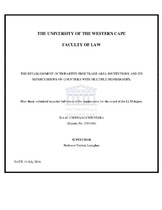The establishment of Tripartite Free Trade Area institutions and its repercussions on countries with multiple memberships
Abstract
This mini thesis examines the repercussions of the establishment of institutions under the Tripartite Free Trade Area (TFTA) Agreement on countries that have multiple regional economic community (REC) memberships. The study notes that even though the TFTA initiative is being touted as a major milestone towards the ultimate establishment of the African economic Community (AEC) and that it will help solve problems associated with multiple REC memberships, the initiative may come at a cost to countries, especially those that have maintained multiple REC memberships. The study observes that the institutions that have been established under the TFTA are a mirror reflection of the already existing institutions in the three existing regional blocks forming the TFTA, thus the Common Market for Eastern and Southern Africa (COMESA), East African Community (EAC) and the Southern Africa Development Community (SADC). The mini thesis argues that the creation of new TFTA institutions, in addition to the similar existing regional institutions, will translate into more financial costs; increased human resource cost for government officers; increase in non-financial treaty related obligations; and a high possibility of reaping fewer trade related gains, for countries that have multiple REC memberships. The mini thesis further demonstrates how the lack of clarity and hierarchy in the relationship between the TFTA institutions and the RECs’ institutions may negatively impact on countries that have multiple REC memberships. The mini thesis concludes by offering recommendations on how these challenges or costs on countries with multiple REC memberships can be addressed or ameliorated.

